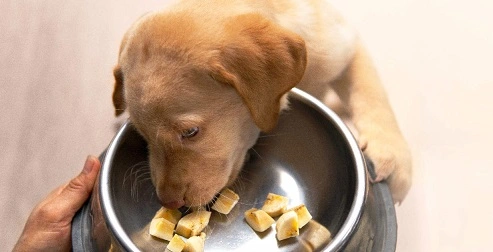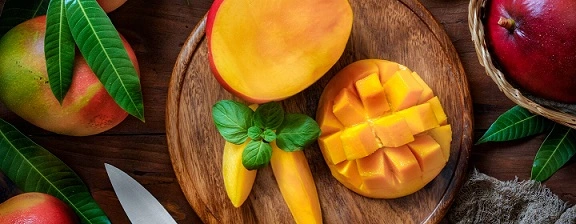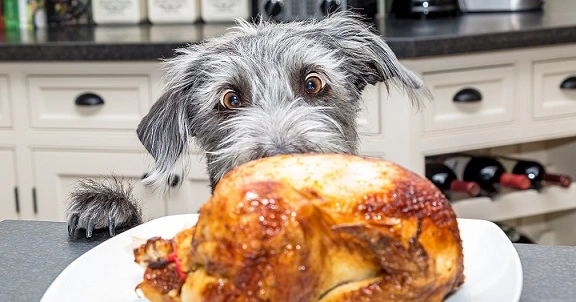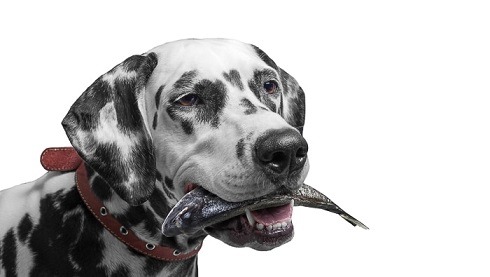Can Dogs Eat Banana, Are bananas good for dogs? Here is everything you need to know to ensure that your four-legged friend has the perfect nutrition.
Today we will go to understand together if you can give bananas to dogs. Banana is a precious fruit because it is a not indifferent concentrate of vitamins and mineral salts. Its composition is 75% made of water and the remaining 25% is made up of carbohydrates, fibers, proteins, and fats.
This makes it a complete fruit rich in nutrients, very useful to the body, such as iron, calcium, and potassium.
It is not a food to be underestimated, because it is an excellent hunger breaker and is able to relieve cramps and protect the heart. All this applies to humans, but is it the same for dogs?
Dogs also love the sweet taste of banana, which unlike many other fruits has no sour or sour notes, is mushy, and melts in the mouth.
Can we, therefore, give a piece of this tasty fruit to our Fido? Here’s everything there is to know about bananas, dogs, and poisonous fruits for him.
Can Dogs Eat Banana?
As per The American Kennel Club, The answer is absolutely positive. Banana, even better if fresh and ripe enough, is a perfect snack for the dog, especially for the more athletic and sporty ones, who always lead a life outdoors and run a lot throughout the day.
In fact, it replenishes the mineral salts lost during play and strengthens the muscles, thanks to magnesium, potassium, and vitamin B, which it contains in abundance.
Without exaggerating, you can therefore make the dog happy by giving him a banana every now and then. Choose one that is neither too green nor too ripe, because the darker parts are the most sugary ones.
What Are The Benefits of Banana for Dogs?
Have you ever wondered what a banana contains? In addition to being rich in vitamin B6, bananas are a good source of vitamin C, dietary fiber, and manganese. Bananas are also free of fat, sodium, and cholesterol. What does this mean for health?
1. Vitamin B6.
Very present in bananas, it is easily absorbed by the body. A banana provides about a quarter of our daily requirements. Vitamin B6 Helps To:
- produce red blood cells
- metabolize carbohydrates and fats and transform them into energy
- metabolize amino acids
- remove unwanted chemicals from the liver and kidneys
- keep the nervous system healthy.
2. C Vitamin
A banana provides about 10% of the daily requirement of vitamin C. Vitamin B6 Helps To:
- protect against cell and tissue damage,
- better absorb iron
- produce collagen
- ensure brain health by producing serotonin, a hormone that affects our sleep cycle, moods, and experiences of stress and pain.
3. Manganese –
One banana provides about 15% of the daily manganese requirement. Manganese helps the body produce collagen and protects the skin and other cells from free radical damage.
4. Potassium –
One banana provides about 300-400 mg of potassium, which satisfies about 10% of the daily potassium requirement. It helps keep heart and blood pressure healthy. Additionally, bananas are low in sodium. The combination of low sodium and high potassium helps control high blood pressure.
5. Fibers –
A banana provides around 10-12% of the daily fiber requirement. Soluble and insoluble fiber plays an important role in health.
6. Sucrose ,Fructose & Glucose
Bananas contain three natural sugars – sucrose, fructose, and glucose – which provide fat and cholesterol-free energy. As such, bananas are ideal, especially for children and athletes, for breakfast, as a snack, or before and after sports.
Can Dogs Eat Banana Peels?
The speech is different with regard to the banana peel. When you give this fruit to your dog, peel it first, for two reasons:
- often the peels are covered with pesticides and even washing them is not completely eliminated;
- the peel is rather difficult to digest.
Especially if you have a dog with a delicate stomach, the advice is to remove the peel to avoid indigestion and intestinal blockages.
How Many Banana Can I Give My Dog?
Medium or large dogs can be given about half a banana.
Small dogs can only be given a few slices (maximum 2 or 3).
Finally, always remember, that fruit and vegetables can only make up a small percentage of the caloric intake expected for the dog (about 10%).
For example –
- Medium to large dogs can be allowed about half a normal-sized banana.
- Small dogs can only be given 2 or 3 slices.
How to Feed Your Dog Banana?
There are so many ways to feed your banana. some are given below

- Mash it up with his food.
- Mix it into a little dog-safe peanut butter.
- Stuff it into a Kong and freeze it.
- Freeze the whole banana, peel it, and slice it.
DIY Banana Dog Treat
If your 4-legged friend is reluctant to eat them, here are some ideas to make him taste this fruit:
- Mash and mix the banana with other food, kibble, or rice.
- Mash it, grind it to a pulp and serve it alone.
- Cut it into slices and freeze it, on the hottest days your dog will like it for sure.
FAQ
Can I feed my dog a banana every day?
Yes, bananas are completely safe for dogs so it can be given to dogs every day but in small quantities.
Can dogs have mashed bananas?
It depends on the dog to the dog if your dog eats very fast so no need to mash the banana but if your dog eats very slowly so in this case, you can give mashed banana to your dog.
Read more helpful articles:-
- Can Dogs Eat Sour Cream
- Can Dogs Eat Bread
- Can Dogs Eat Raw Meat
- Can Dogs Eat Chocolate
- Can Dogs Eat Avocado
- Can Dogs Eat Sweet Potatoes
- Can Dogs Eat Watermelon
- Can Dogs Eat Popcorn
- Can Dogs Eat Broccoli
- Can Dogs Eat Oranges
- Can dogs Eat Tomatoes
Last Words :-
Friends, I hope You must have liked the blog “Can Dogs Eat Banana? Benefits and Risks“
If you have any feedback, then definitely tell us by going to Contact Us, you can email me or follow me on social media Will see you soon with a new blog, till then stay tuned to my blog “Thanks



